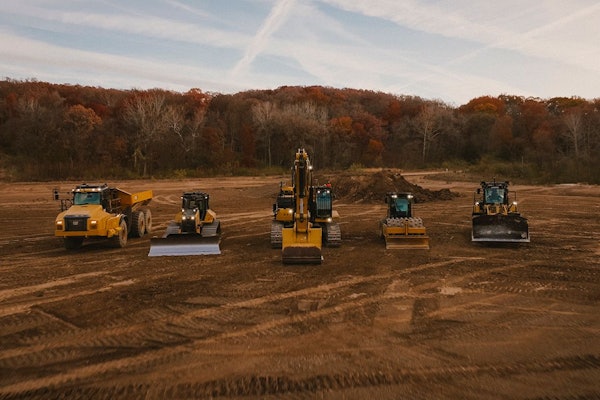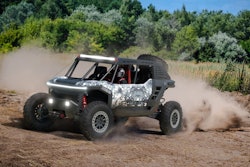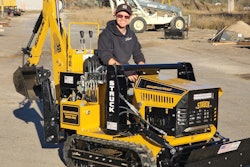When Caterpillar asked Sean Leiber to be an equipment demonstrator/instructor at its Tinaja Hills proving grounds near Tucson, Arizona, Leiber knew it was the opportunity of a lifetime. So he pressed the pause button on the fledgling construction company he had recently founded.
The unexpected job offer came after Leiber had begun purchasing equipment for his company and visited Tinaja at the invitation of his Caterpillar dealer. He operated some mining equipment and impressed the staff at the training center – despite the fact he hadn’t spent much time behind the controls of such machines. One of the instructors asked him if he wanted a job, and soon afterward a manager called him in for an interview.
“I just had the knack for it,” Leiber recalls. “They saw something in me. I said to myself, ‘I’ll try this knowing I won’t stay in it forever.'”
From 1996 to 1999, Leiber demonstrated equipment at Tinaja Hills and traveled the world, going to countries in South America and Central America to train operators in the field. He was in charge of Caterpillar’s building construction products demonstration site at the 1999 ConExpo-Con/Agg tradeshow.
After that he returned to Earth-Scrapes Excavating, the company he had put on hold. He needed a partner and had known Jody Mott for 20 years. He had asked Mott to join him in 1994, but Mott turned him down, saying he couldn’t live without a regular paycheck. Mott had spent time in the construction industry as a teenager and remembered the work had not been steady.
Leiber’s timing was better the second time around. Mott had been working at UPS for eight years and didn’t find the job satisfying. “At the end of the day, you didn’t see anything that you had done or built,” he says. To underline his dissatisfaction, the company had just experienced a strike.
Mott says visiting Leiber at Tinaja and seeing the massive equipment at work played a role in his decision as well. “It just looked like a lot of fun,” he says.
So Leiber and Mott began doing weekend and after-hours work to get started, performing finish work and light site preparation for subdivision builders. The two had gone to work for Earth-Scrapes full time by 2000. Mott gave up a new pickup truck he had just leased and used a dump truck for his personal vehicle, driving it everywhere from the grocery store to the gym so he and Leiber could grow their business.
Word soon got around. Builders would see Leiber and Mott at work and ask them to do jobs. At that point, Leiber says they weren’t picky about types of projects. “We were trying to tackle all the jobs,” he says. “We were hungry and we needed to work.”
Finding a niche
In 2001 the company found its niche – hard rock excavation. During his time at Tinaja, Leiber learned to operate equipment efficiently in a challenging environment. Today the company specializes in the excavation of multi-million-dollar custom home sites located in the rocky, mountainous terrain on the outskirts of Tucson. The company has expanded its list of services from finish work to mass excavation, underground utility installation and sewer, drain, pipeline and road work. Earth-Scrapes has seven employees counting Leiber and Mott, who are still owner-operators.
On their custom home sites, Leiber and Mott work within the clearing limits to remove unusable vegetation and lift and set the naturally weathered boulders for landscaping. They do the cut, fill and compaction work for the house, dig the pool, trench for utilities, footings and plumbing and install the septic system. Toward the end of construction they come back to check drainage and dress everything up with a final grade.
The company now works with four to six homebuilders. Leiber attributes Earth-Scrape’s success to the quality of work the company does and the equipment it owns. Because Earth-Scrapes is owner operated, Leiber says he and Mott take pride in their work and strive to maintain a close working relationship with their clients.
Grady Artaz, president of Gradybilt Design, says he is proud to bring people from Earth-Scrapes Excavating onto his projects. “Sean and Jody show professionalism from start to finish,” he says. “Their attention to detail and old-fashioned manners complete the package of a great company.”
Leiber and Mott have made a name for themselves with clean, well-maintained machines. They even wax the company’s equipment.
Immaculate machines
Leiber and Mott purchase only new Caterpillar equipment and they painstakingly maintain it. “We wax our machines,” Leiber says. “When you’re working on someone’s $10 million job, you have to look professional.”
The company has a reputation for having the nicest construction equipment in the area and strangers compliment Earth-Scrape’s machines almost every time a truck carrying a piece of equipment stops at a fuel station. Once Leiber took a machine to the dealer for its 2,000-hour service interval – the only maintenance Earth-Scrapes employees don’t do themselves – and the maintenance manager told him the machine was not his. The manager insisted the machine was new, and yet it was three years old. “He asked me if I was moving marshmallows,” Leiber recalls.
Employees feel like owners
Because of the status their well-maintained equipment has earned them in the community, Leiber and Mott don’t have any trouble finding employees. People call them looking for work.
Leiber and Mott’s philosophy for keeping employees is to treat them the way they themselves would want to be treated. They give accolades along with corrections, telling employees when they’ve done something wrong, but also rewarding them for good things, such as when a customer praises a crew.
“Most of our guys’ mentality is not like that of an employee,” Leiber says. “It’s like they’re owners.”
All Earth-Scrapes employees know how to inspect, clean and maintain the company’s equipment, and operators know how to run all the machines in the company’s fleet. “Our guys are versatile,” Mott says. “They can move from machine to machine with confidence.”
Looking toward the future
Leiber and Mott plan to stay in the same market – site prep for custom homes – but want to increase the number of accounts they have. They plan to hire five or six more employees in the coming year.
Six months ago they purchased a five-acre site with an office building and a yard where they can store rock and other material from their jobsites. Before the company was paying to haul material away at the beginning of a project and then paying to have similar material brought back at the end of the job. Now Leiber and Mott bring the material to their yard, process it, reuse it themselves or sell it to other contractors. They’re buying an extra wheel loader and dump truck to keep up with work at the material yard. “It’s turning into a profitable business sooner than we expected,” Leiber says.







